Contents
i Political
Campaigning
in the U.S.
Managing The Chaos
David A. Jones
James Madison University
ROWMAN & LITTLEFIELD
Lanham Boulder New York London
ii
Executive Editor: Traci Crowell
Assistant Editor: Deni Remsberg
Higher Education Channel Manager: Jonathan Raeder
Interior Designer: Pro Production Graphic Services
Credits and acknowledgments for material borrowed from other sources, and reproduced with permission, appear on the appropriate pages within the text.
Published by Rowman & Littlefield
An imprint of The Rowman & Littlefield Publishing Group, Inc.
4501 Forbes Boulevard, Suite 200, Lanham, Maryland 20706
www.rowman.com
6 Tinworth Street, London SE11 5AL, United Kingdom
Copyright 2021 by The Rowman & Littlefield Publishing Group, Inc.
All rights reserved. No part of this book may be reproduced in any form or by any electronic or mechanical means, including information storage and retrieval systems, without written permission from the publisher, except by a reviewer who may quote passages in a review.
British Library Cataloguing in Publication Information Available
Library of Congress Cataloging-in-Publication Data
Names: Jones, David A. (David Adams), 1965 author.
Title: Political campaigning in the U.S. : managing the chaos / David A. Jones.
Other titles: Political campaigning in the United States
Description: Lanham, Maryland: Rowman & Littlefield, 2020. | Includes bibliographical references and index. | Summary: Provides readers with a comprehensive yet concise and accessible overview of modern U.S. election campaign practices Provided by publisher.
Identifiers: LCCN 2019052739 (print) | LCCN 2019052740 (ebook) | ISBN 9781538115183 (cloth) | ISBN 9781538115190 (paperback) | ISBN 9781538115206 (epub)
Subjects: LCSH: Campaign managementUnited States. | Voting researchUnited States. | Mass mediaPolitical aspectsUnited States. | Social mediaPolitical aspectsUnited States. | Campaign fundsUnited States.
Classification: LCC JK2281 .J66 2020 (print) | LCC JK2281 (ebook) | DDC 324.70973dc23
LC record available at https://lccn.loc.gov/2019052739
LC ebook record available at https://lccn.loc.gov/2019052740
 The paper used in this publication meets the minimum requirements of American National Standard for Information SciencesPermanence of Paper for Printed Library Materials, ANSI/NISO Z39.48-1992.
The paper used in this publication meets the minimum requirements of American National Standard for Information SciencesPermanence of Paper for Printed Library Materials, ANSI/NISO Z39.48-1992.
Contents
iii
iv
v
Figures, Tables, and Textboxes
vi
FIGURES
TABLES
TEXTBOXES
vii
Preface
viii
DONALD TRUMPS GENERAL ELECTION victory was a shock, but winning the Republican nomination was even more unlikely. Trump didnt run a single television ad until January 2016, when the primary season was well underway. Through February, he had spent only $10 million on advertisinga miniscule amount compared with establishment GOP rivals Jeb Bush ($82 million), Marco Rubio ($55 million), and less even than his fellow upstart Ted Cruz ($22 million) and John Kasich ($14 million) (Confessore and Yourish ). Trump was obsessed with his lead in the polls, but did almost no polling of his own. His staff combined youth with inexperience (his twenty-six-year-old press secretary had never worked on a political campaign). His ground game was minimal. He made shameful statements that offended many voters, including members of his own party.
Although Trump received an abundance of media coverage, much of it was negative. His nomination was opposed by many Republican party leaders and conservative columnists. Against entitlement spending cuts and free trade agreements, he advocated policy positions that ran counter to conservative Republican orthodoxy. The year 2016 was supposed to be the election of super political action committees (PACs) and big data, but Trump had neither. Not only did he break every nearly rule in the proverbial campaign playbook, he didnt have copy of the book, nor did he seem interested in obtaining one.
By contrast, Trumps top Republican rivals ran relatively conventional campaign operations. They spent millions of dollars on ads aired on television and online. They set up ambitious fundraising ix operations and formed super PACs to pay for these ads. They opened field offices in key primary and caucus states. They sought endorsements from their fellow Republicans. Some of them employed sophisticated analytics to tailor their messages to targeted audiences. They participated in rigorous prep sessions before each debate. Yet they all lost to a candidate who did none of these things.
Trumps Republican electoral success may prove to be an anomaly. As this book will show, candidates and their campaign organizations usually employ standard practices as they attempt to manage the race in their favor. Sometimes they innovate, but mostly they go with what they know and assume it will work. Yet this book also will show how fruitless these efforts can be. Campaign organizations have very little control over manyperhaps mostaspects of the election. An incumbent candidate can run a nearly flawless campaign operation, but then lose if the economy tanks. A strong challenger can hire energetic and well-trained staffers who employ innovative campaign techniques, but then lose because incumbents nearly always win. Early in the 2016 race for the Republican presidential nomination, Jeb Bush hired top Republican consultants to run his campaign, and his super PAC was flush with cash. He led early polls and secured endorsements from GOP officials. But then Trump entered the race and everything changed. Neither Bush nor any of the other GOP candidates could convert whatever strategic and resource advantages they possessed into a consistently strong showing in the primaries and caucuses. In different ways, all sixteen of them were shown that campaign operations are often more engaged in managing the chaos around them than exerting control over predictable events.
The purpose of this book is to provide readers with a comprehensive yet accessible overview of modern election campaign practices. The book is premised on the idea that all students (not just political science majors) and indeed all citizens (not just news junkies) need to understand how campaigns operatehow they collect information about voters; how they attempt to change what voters think about the candidates; and how they encourage voters to think and act in certain ways. The books analysis will be grounded in dozens of academic studies that assess what works and what does not. Readers will see that campaigns have become remarkably innovative in terms of technology, information management, messaging, communication strategy, and fundraising. But readers also will see that much of what campaigns do is only marginally effective. A campaign might spend hundreds of thousands of dollars on clever, methodically targeted x advertising, but their efforts may be matched and therefore cancelled out by their opponents similar investments. A campaign might build a sophisticated field operation informed by sophisticated analytics, but it cannot recruit enough volunteers who are enthusiastic about the candidate. A campaign might develop constructive relationships with various media outlets, but its candidate gets overwhelmingly negative coverage anyway. Deft campaigning never guarantees positive outcomes.
Outline of the Book
A campaign organizations inability to control election dynamics will first become apparent in , which analyzes the importance of the political landscapeor, what some call the fundamentals, the political environment, or the campaign context. The political landscape consists of the givens that the campaigns cannot control at all. Campaigns must plan around and adapt to the conditions that make up the landscape. These fundamentals include the composition of the electorate, especially the percentage of the electorate that identifies with each party. The electorates demographic compositionrace and ethnicity, income and education levels, religiosityalso make up part of the landscape. Even more important may be the state of the economy, the mood of the electorate, major external events, and even such specific indicators such as the approval rating of the president. Campaigns also must account for the type of election in which they are running. General elections pitting the two parties against each other have fundamentally different campaign dynamics than intraparty primaries and caucuses. Midterm elections attract different voters than elections held during presidential years. Primaries attract different voters than caucuses. Other consequential givens include location-related characteristics such as state-specific election laws and procedures.


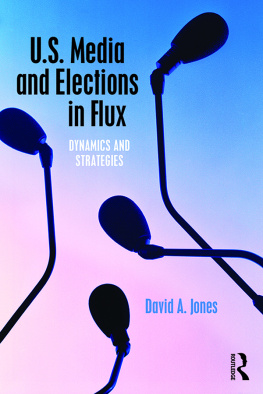


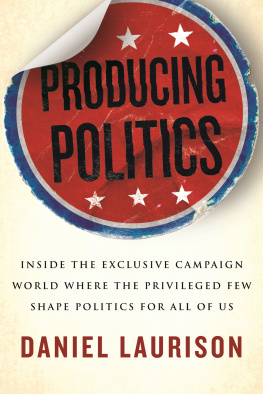
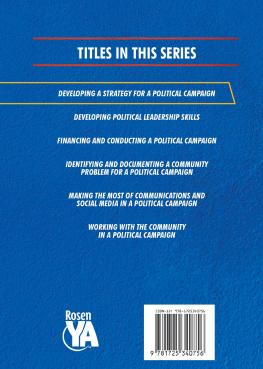
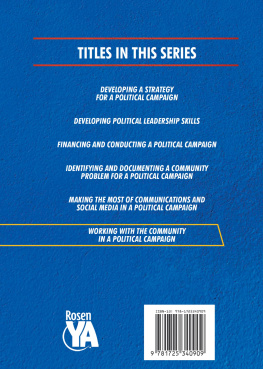

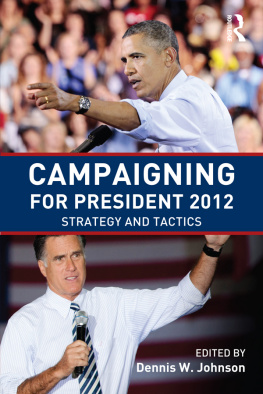
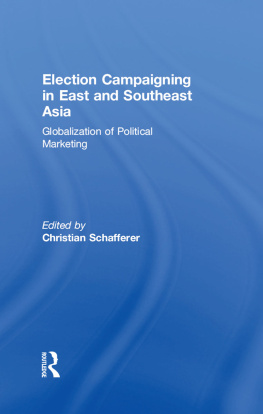
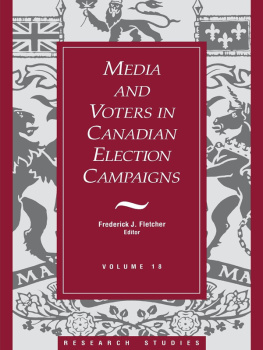
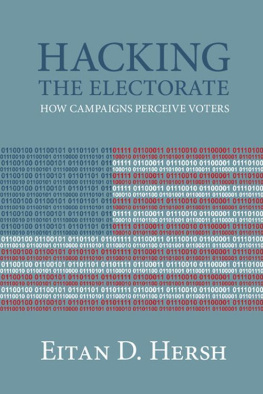

 The paper used in this publication meets the minimum requirements of American National Standard for Information SciencesPermanence of Paper for Printed Library Materials, ANSI/NISO Z39.48-1992.
The paper used in this publication meets the minimum requirements of American National Standard for Information SciencesPermanence of Paper for Printed Library Materials, ANSI/NISO Z39.48-1992.